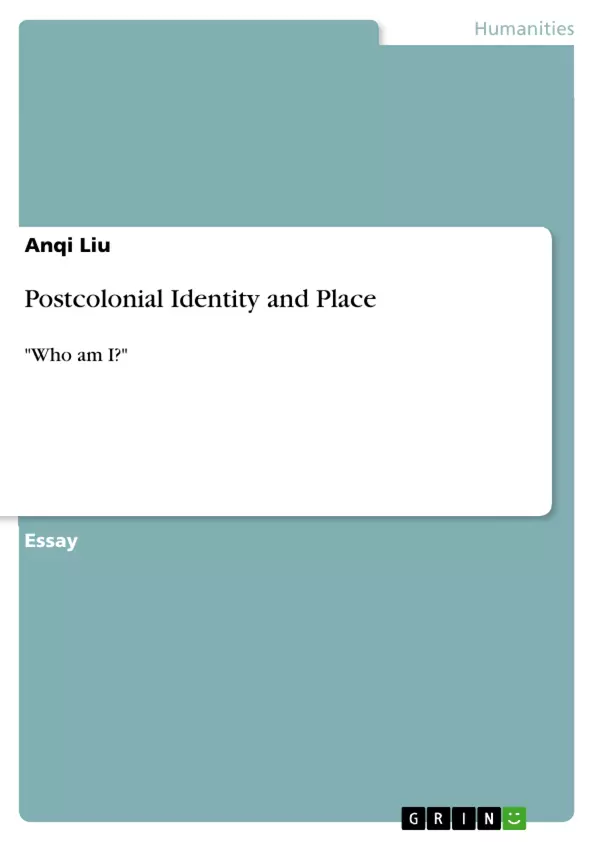Postcolonial studies aim at stripping away conventional thoughts and examine what kind of identity emerges in postcolonial subject. The first problem when I set out to work on postcolonial literatures is to confirm its scope. This word scope that I put forward here can be explained as follows, on the one hand, postcolonial literature is apparently vague and general. It’s such a multinational and multicultural case that it is hard to define which country falls under the rubric. Except what we always mentioned as “postcolonial countries” such as Nigeria, India and Pakistan, some writers include also countries like Canada, Ireland and Australia. So when we read the literatures about postcolonial, it is apparent for us to discover, that they include two parts, on the one hand, it is based on the dominant or colonizer society, on the other hand, it talks also about the dominated or colonized society.
On the other hand, there are a large number of relevant themes or aspects around the topic postcolonialism: migration, race, gender, resistance, slavery and so on. Trying to cover all the countries and aspects in one essay seems not so specific. In my essay, I will focus on the question “Who am I ?”. This kind of doubt about one’s identity is a “derivative product” of colonialism and a very important topic in postcolonial world. When we read literatures, we are able to seek out, what the indigenous voice want to express, how should the indigenous people see themselves, once their place and identity were forced to change? Is the dual identity always ambivalent? These questions are what I’m going to explain hereinafter.
Inhaltsverzeichnis (Table of Contents)
- Introduction
- Identity: How to treat yourself…...
- Grey Owl: A reasonable escape and the search for true-self....
- Place: Where should I belong?
- Isabelle Eberhardt: Even the clearest mirror loses its function..
- Grey Owl and Isabelle Eberhardt: A Comparison ....
- Conclusion........
Zielsetzung und Themenschwerpunkte (Objectives and Key Themes)
This essay explores the complexities of postcolonial identity and place through the lens of two notable figures: Grey Owl and Isabelle Eberhardt. The author aims to analyze how their experiences with colonialism and cultural displacement impacted their sense of self and belonging. The essay delves into the themes of identity formation, cultural appropriation, and the struggle to reconcile personal identity with the broader societal and political context.
- The impact of colonialism on individual identity and self-awareness.
- The role of cultural appropriation and the search for a true self in a postcolonial world.
- The complex relationship between place, identity, and belonging in the context of colonialism.
- The resilience and adaptability of colonial societies.
- The challenges of defining and understanding postcolonial literature.
Zusammenfassung der Kapitel (Chapter Summaries)
- The introduction sets the stage for the essay, outlining the key concepts of postcolonialism and the complexities of identity formation in a postcolonial context. It highlights the enduring legacy of colonialism and the challenges it poses to colonized societies.
- The chapter on identity delves into the concept of identity as a dynamic and fluid process, shaped by historical experiences, cultural influences, and power relations. It highlights the challenges of navigating multiple identities in a postcolonial world.
- The chapter on Grey Owl explores his ambivalent identity as a "white Indian" and the complexities of his search for a true self. It analyzes how his experiences with colonialism and cultural appropriation shaped his self-perception.
Schlüsselwörter (Keywords)
The main keywords and focus topics of this text include postcolonialism, identity, place, colonialism, cultural appropriation, self-awareness, cultural identity, and indigenous cultures. The essay examines how these themes intersect and influence the individual experiences of Grey Owl and Isabelle Eberhardt.
Frequently Asked Questions
What is the central focus of postcolonial studies regarding identity?
The field examines how identity emerges in postcolonial subjects after their original place and identity were forced to change by colonial powers.
Who was Grey Owl in the context of postcolonial identity?
Grey Owl was a "white Indian" whose life represents an ambivalent search for self through cultural appropriation and escape from dominant society.
How does Isabelle Eberhardt represent postcolonial themes?
Eberhardt's life illustrates the struggle for belonging and the loss of a clear reflection of self when navigating between cultures.
Is dual identity always ambivalent in postcolonialism?
The essay explores whether having multiple cultural identities leads to a state of ambivalence or a new form of self-awareness.
What are the key themes of postcolonial literature?
Key themes include migration, race, gender, resistance, slavery, and the fundamental question of "Who am I?".
- Citar trabajo
- Anqi Liu (Autor), 2017, Postcolonial Identity and Place, Múnich, GRIN Verlag, https://www.grin.com/document/429922



